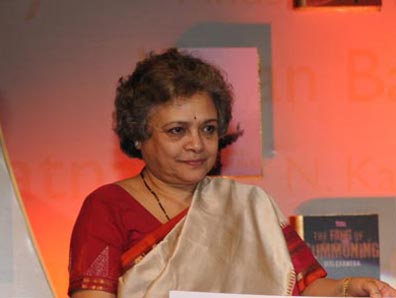 New Delhi:
New Delhi: Notions of womanhood have changed in urban India with power moms at the workplace and women storming into male bastions, but these women must open communication doors with their counterparts in villages, suggests veteran journalist-writer Mrinal Pande.
"Why don't feminists talk to girls from deprived sections? How can you talk of equality when you cannot break the communication lock in your own cadre so that women of all classes are taken seriously? I have seen women from villages who attend big conclaves participating like dolls...their voices are rarely heard," Pande told in an interview.
"What needs to change now is the woman's self-perception," Pande, who is also the chairperson of Prasar Bharati, the public broadcaster, said.
"In my new book, 'The Other Country: Dispatches From the Mofussil (Penguin-India)', I have tried to explore the two tectonic plates - rural and urban - colliding and generating energy," Pande said.
"We are living in interesting times where history is colliding with modernity in so many ways," the journalist-writer said.
Advocating reforms in education, language, women's welfare and better communication between cities and villages, Pande said "the prosperity of urban India cannot be realised unless the rural areas release their resources".
"Rural India often rises in anger against sharing as the rebellion at Singur and the Naxal unrest have proved. Two different cultures exist cheek by jowl. The resentments are age-old forces at work since the Mahabharata. 'Sui ki barabar ka zameen nahin doonga (I will not give a needle strip of land)', king Duryodhan had said in the Mahabharata," Pande said, referring to the conflicts between development and land.
Pande, the daughter of well known Hindi writer Shivani, observed that "villages are another country".
"We are in denial about our need to understand changes in rural India. Physical changes are taking place very fast in contrast to changes in human nature," Pande said.
Pande draws the root of the conflict to the time "when India started displacing people for development". "Displacement creates a backlash throwing up new leaders," she said.
"Info-tech is a ray of hope because small towns are getting linked to big city ethos through blogspots and social networking," she said. And Bollywood is becoming a great Indian leveller by producing a Kolaveri D culture.
"The culture of India has been a cluster of small cultures," Pande said.
The writer advocates a three-language formula to close the rural-urban-mofussil gap.
"Eminent freedom fighter and educationist Triguna Sen had thrown up a three-language formula. He said children should be taught English, their mother tongue and a northern language in south India and a southern language in north India. While the south was honest (they taught their children Bangla and Hindi), the north cheated by offering Sanskrit, a scoring subject to its students," Pande said.
"I feel that formula should be revived in government schools and in the states," Pande said.
Bringing out a duality in education, Pande said "today's Mandalised leaders insisted on teaching children in their mother tongues".
"But Laloo Prasad sent all his children to a convent school in Ranchi and Mulayam Singh Yadav sent his son to Australia. The poor were dealt a double whammy by denying them the language that would tip scales in good jobs in their favour. We need to come out of this denial," she said.
Pande said "neither the parents nor teachers in semi-urban and rural areas have language skills and their children are growing up without language," Pande said.
"Half of the unrest on the campus is caused by lack of communication between students from cities, rural and semi rural areas; between teachers and students and between the economists and the developmentally deprived sections," she said.
The "Shiv Sainiks are known to beat up V-day revellers", she said. "If the Shiv Sainiks are allowed to court girls for 15 days, they would become normal citizens," Pande said pointing out disparities in communication and awareness among youth.
Pande, the author of five books, translated "1857: The Real Story of the Great Uprising" by Vishnu Bhatt Godshe Versaikar in 2011. She is now translating a book, "Gadar ke Phool", a history of Avadh 100 years after the 1857 uprising, by Amritlal Nagar.
 New Delhi: Notions of womanhood have changed in urban India with power moms at the workplace and women storming into male bastions, but these women must open communication doors with their counterparts in villages, suggests veteran journalist-writer Mrinal Pande.
New Delhi: Notions of womanhood have changed in urban India with power moms at the workplace and women storming into male bastions, but these women must open communication doors with their counterparts in villages, suggests veteran journalist-writer Mrinal Pande.